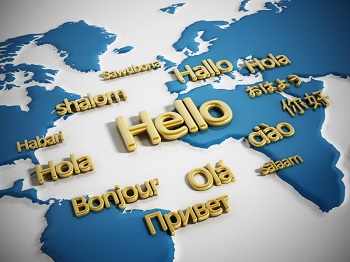Native English – Bad for Communication?
 English! It’s the language of today and of tomorrow that you should speak if you wish to be understood… Except if you are a native speaker of English, it seems. Anglophones from the US, UK, Australia, Canada and several other countries should take a long look at how they use their mother tongue, as it was recently discovered that they are absolute worst at business communication. Read on…
English! It’s the language of today and of tomorrow that you should speak if you wish to be understood… Except if you are a native speaker of English, it seems. Anglophones from the US, UK, Australia, Canada and several other countries should take a long look at how they use their mother tongue, as it was recently discovered that they are absolute worst at business communication. Read on…
This is not all that surprising, according to BBC. Several main reasons for the sorry state of affairs are very easy to spot. First of all, people with English as their first language rarely have to learn any other language. They tend to be able to communicate everywhere, so there is little need for them to learn additional tongues. This, experts say, makes them less aware of what difficult words are, or what some British or American idioms may mean to a learner from another country. As a result, Brits or Americans do not speak simply and clearly, but instead just like they normally do at home. They may not consider their speaker’s level of understanding and are much less forgiving if someone they are talking to makes mistakes.
That lack of caring is one of the main reasons they rarely communicate well when dealing with non-native speakers in business. Several studies, in fact, show that non-native speakers negotiate in business better and are better overall at communication.

Many business experts cite speech speed of native speakers as one important hurdle that may play a part. But there may be more to that than simply speaking too fast or too unclearly. They may also expect others to speak just as fast and treat lack of reaction as agreement. However, at meetings, non-native speakers are often simply searching for a good word to say and a clearer way to communicate. Unfortunately, very soon native speakers are already moving on and saying something new. Rob Steggles is a senior marketing director at NTT, and he’s keenly aware of the problem. “You just have to wait a heartbeat and give them a chance. Otherwise, after the meeting they come up and say, ‘What was all that about?’ Or they walk away and nothing happens because they haven’t understood.”
One related problem is a feeling of shame, linked to not understanding someone but being too shy to speak up. This, too, is because native speakers are often too eager to fill in silences and to speak fast. This makes many non-native speakers afraid to admit they do not understand. “Too many non-Anglophones, especially the Asians and the French (…) nod approvingly while not getting the message at all,” says Jean-Paul Nerrière, former senior director at IBM.

To overcome this problem, he created Globish – a special version of English which uses just 1,500 basic words and is all about clear, simple speech. There may be something to it, as since its creation in 2004, Globish course books were bought 200,000 times in 18 languages.
But not everyone agrees that only native speakers are responsible for problems with communication. Top-level executives and senior management are expected to speak English as well as their native speaking counterparts.
Michael Sakpinker over at Financial Times is clear about the issue. “Their vocabulary is bigger than 1,500 words. They engage with native English speakers with confidence. And they are taking over the world. (…) You can appreciate how impressive this is only if you have attempted to master a foreign language yourself. These elite performers actually do better than many native English speakers,” he says. So… Perhaps it’s the foreign speakers who need to brush up on their English?
Speaking at Observer, Robert McCrum – who himself has penned a book entitled “Globish” –does not think tools like Globish are just about speaking easier. According to him, “Nerrière describes Globish as a device that will ‚limit the influence of the English language dramatically.” Globish will be “helping the rescue of French, and of all the languages that are threatened by English today but which will not be at all endangered by Globish,” he explains. Globish may, in fact, be fighting globalization, despite having part of that word in its name.

To be sure, it will not stop globalization. And yet the world doesn’t seem to be becoming English, even though the number of ESL (English as a second language) users is growing in business much faster than the number of speakers of other languages. There is even an acronym for that phenomenon – EFL, English as Lingua Franca. Ironically (for Globish creator, at least), one of the first LF’s was French, which is now less popular, even if it is one of the official EU languages. That said, most of the world’s native speakers still speak Hindi or Chinese, and the amount of non-native users of English is much greater than those who are born with it.

It seems that native speakers of English are left with a choice. Either they will have to eventually use a tool like Globish or… they will have to learn how to speak English once more. Yes, it is very much a thing now! Udemy actually has a course on how to speak English in business and overseas contexts with non-native speakers. The course is aimed specifically at native speakers of English. Let’s just see if any of them will actually take that course. Will they be able to describe how it went in a simple way?
VOCABULARY
Anglophone – osoba anglojęzyczna
to take a long look – dobrze się czemuś przyjrzeć
mother tongue – język ojczysty
absolute worst – absolutnie najgorszy
sorry state of affairs – przykry stan rzeczy
to spot – dostrzec
there is little need for sb to do sth – nie ma zbyt wielkiej potrzeby, by ktoś coś robił
aware of sth – świadomy czegoś
to consider sth – rozważyć coś, pomyśleć o czymś
forgiving – pobłażliwy
lack – brak
to deal with sb – tu: kontaktować się z kimś, zajmować
study – badanie, studium
overall – ogółem
to cite – przytaczać
hurdle – przeszkoda
there is more to X than Y – w X chodzi o coś więcej niż (tylko) Y
to move on – przejść dalej, kontynuować
keenly – ostro, mocno
to wait a heartbeat – poczekać jedno mgnienie/chwilę
to come up – tu: podejść
what was all that about? – o co w tym wszystkim chodziło?
shame – wstyd
shy – nieśmiały
to speak up – zabrać głos
eager – chętny, skory
to fill sth in – zapełnić coś, wypełnić
to admit – przyznać
to nod – kiwać głową (na potwierdzenie)
approvingly – z aprobatą
former – były, dawny
to overcome sth – przezwyciężyć cos, pokonać
there may be something to sth – coś może być na rzeczy z czymś, w czymś może być coś ważnego
responsible for sth – odpowiedzialny za coś
top-level – najwyższego szczebla
executive – dyrektor, menedżer szczebla kierowniczego spółki
counterpart – odpowiednik
to engage with sb – komunikować się z kimś
confidence – pewność siebie
to take sth over – przejąć cos, zdobyć
to appreciate – docenić
impressive – imponujący
to master sth – opanować coś
performer – ktoś, kto ma wysokie osiągi, ktoś, kto jest w czymś dobry
to brush up on sth – podszlifować coś, doszlifować
to pen sth – napisać coś (książkę)
entitled – zatytułowany
device – narzędzie
influence – wpływ
to threaten sth – zagrozić czemuś
to endanger sth – narazić coś na niebezpieczeństwo, zagrozić czemuś
despite – pomimo
acronym – akronim
phenomenon – fenomen
Lingua Franca – lingua franca, język danej branży
eventually – ostatecznie, w końcu
overseas – zagraniczny
to take the course – odbyć kurs, pójść na kurs
by Prochor Aniszczuk







